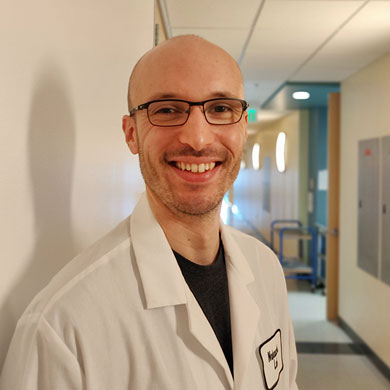
Researcher Profiles

Adam C. Wilkinson, Ph.D.
2020 Funding recipient
Interrogating MDS with a novel ex vivo culture system
EvansMDS Young Investigator Award
PROJECT SUMMARY
Bone marrow hematopoietic stem cells (HSCs) are responsible for life-long blood and immune system homeostasis, essential for human health. However, the acquisition of somatic DNA mutations by long-lived HSCs can result in dysfunction and hematological disorders, such as the clonal hematopoiesis (CH) and myelodysplastic syndrome (MDS). This pre-leukemic state often progresses to acute myeloid leukemias (AML). Although recurrent mutations in genes such as TET2 and DNMT3A have been identified in CH, MDS, and AML, these mutations alone do not induce disease progression. Instead, other still poorly understood mechanisms regulate transformation of CH to MDS. In order to develop new and effective therapies that reverse or prevent MDS, we must identify mechanisms contributing to MDS disease progression. Unfortunately, the paucity of endogenous HSCs in the bone marrow and historical inability to expand functional HSCs ex vivo has limited the direct investigation of this clinically important population. Here, I propose applying new technologies to study genetic regulators of MDS; a recently developed a culture platform that supports mouse HSCs long-term ex vivo (>1-2 months), achieves ~900-fold expansion of functional HSCs, and generates enough HSCs for nonconditioned HSC transplantation (Wilkinson et al., Nature 2019; Wilkinson et al., Nature Protocols 2020). Importantly, this technology for the first time allows enough HSCs to be generated for large-scale screening. By adapting CRISPR/Cas9 knockout (KO) screening methods (developed by Shifrut et al., Cell 2018) to HSCs, I aim to uncover and decipher mutational cooperation in MDS. I have already optimized this screening pipeline for wild-type HSCs. The overall aim of my research proposal is to identify genetic mutations that cooperate with recurrent MDS-associated genetic mutations to drive MDS disease presentation and progression. By identifying underlying molecular and cellular pathways that drive MDS, I hope to identify new strategies to inhibit the progression from CH to MDS, and thereby improve patient quality-of-life and survival.
